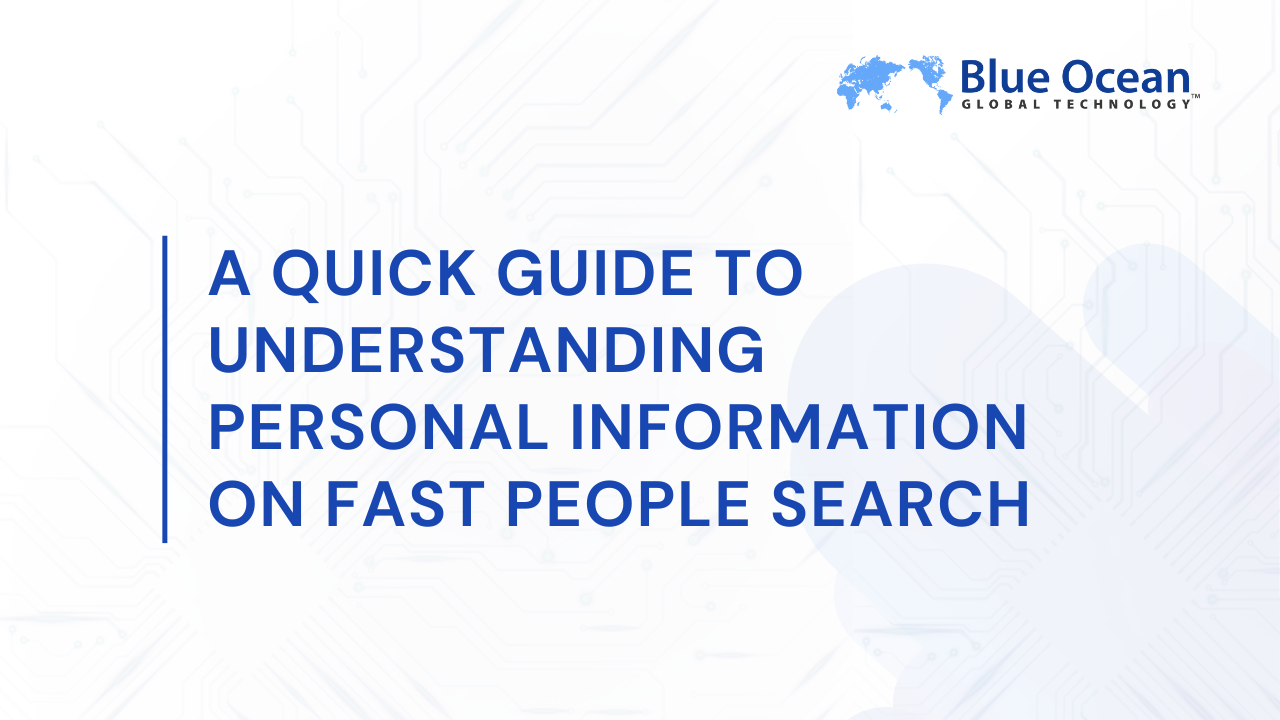- Fast People Search is a platform with growing popularity because of the increasing demand for accessible personal information.
- These tools help to find contact information, conduct background checks, and access various other types of data which might also include sensitive information.
- All of this personal information out in the public domain throws light on how there is an invasion of privacy and raises questions regarding the ethical implication of the Fast People Search
What is a Fast People Search Tool?
Fast People search tools or engines are extremely sophisticated algorithms that search through millions of data and information to find a particular person. Thus, it is a specific– oriented search one can find anyone with a click of a button. Fast people search includes a thorough screening of data by utilizing a combination of data mining, machine learning, and advanced search algorithms. Thus, this information acts as an online reputation for millions of people. It is important to ensure that it is properly managed and used.
Overview of Fast People Search Websites
The first step for any Fast People Search is Data aggregation which in simple words would mean the gathering of data from multiple sources. These data can take various forms. It could either be data in the public domain, or data regarding the birth date or marriage certificates, property records, etc. The next step is matching algorithms. To make data easily available, various filters are added to narrow down the results. The last and most innovative step for Fast People Search is the use of machine learning. This speeds up the accuracy of finding a person even with predictive information.

Examples of Popular Fast People Search Sites
- Truthfinder is a search engine that helps to find police records of an individual, check court records, contact information, etc. in the online domain.
- Intelius is a website that helps with the usual people search details, email lookup, social network search, background check, and criminal records.
- BeenVerified helps to find people using names, email addresses, phone numbers, or locations.
Purpose and Popularity
Fast People Search tool has gained popularity and become a household name in recent times because of its accuracy in helping people reconnect with lost contacts. At the same time, it serves as a mechanism to combat fraud and harassment. If looked at from the employer-employee viewpoint, the Fast People Search tool has been able to help in the screening of job applications. Background checks help verify the authenticity of the information provided. It can also be one of the most affordable ways to search for people on the Internet.
Protect your Personal Information
Do not allow personal information to be manipulated or used illegally.
Types of Personal Information Available
Fast People Search platforms compile a wide array of personal information from various sources. Some of the different types of data commonly available are:
Basic Information
This is the most common type of data found on these platforms and is often enough to identify individuals. It includes:
-
Name
Full legal name, including middle names and variations of names (e.g., nicknames, maiden names).
-
Age and Date of Birth
Users can often find a person’s approximate or exact age and birthdate, which helps in identifying them from others with the same name.
-
Address History
Current and past residential addresses, including city, state, and ZIP code. This helps to trace a person’s movement across different locations over time.
-
Phone Numbers
Current and former phone numbers, both landline and mobile, are often listed. In some cases, the platform may even distinguish between personal and business numbers.

Extended Information
These details provide more in-depth knowledge about a person’s background, potentially uncovering connections to other individuals or additional personal details. They include the following:
-
Relatives and Associates
Lists of known family members, including parents, siblings, spouses, and children. Sometimes, this includes extended relatives like cousins, in-laws, and others associated with the person.
-
Employment History
Some platforms provide information on a person’s current or past workplaces, job titles, and even the industry in which they work. This can be gleaned from public employment records, LinkedIn profiles, or other sources.
-
Education History
Educational background, such as schools attended, graduation dates, and degrees obtained, may be available. This information is often pulled from social media or publicly available resumes.
-
Social Media Profiles
Links to social media accounts (e.g., Facebook, LinkedIn, Twitter) are sometimes provided, giving insight into a person’s social presence and activities. These links allow users to explore an individual’s personal and professional life further.
-
Email Addresses
While less common, some platforms provide email addresses tied to the person. These are usually harvested from publicly available profiles or directories.
Sensitive Information
This type of data is more invasive and can pose higher risks to an individual’s privacy and security. It’s often collected from public records, court documents, or financial databases. It includes:
-
Criminal Records
Information about arrests, charges, convictions, and incarcerations can be found. Some sites provide detailed data on felonies, misdemeanors, traffic violations, and other legal issues.
-
Civil Court Records
Lawsuits, divorce filings, restraining orders, and other civil disputes may be available on these platforms. This is typically gathered from local court databases.
-
Financial Information
Although less detailed than criminal records, some platforms offer insight into an individual’s financial history, including bankruptcies, liens, and foreclosures. They may also indicate whether the person has had property repossessions or garnishments.
-
Voter Registration Information
Some sites provide a person’s political affiliation and voting status, which can be considered sensitive information, especially in politically charged environments.
-
Property Ownership
Records of properties owned by an individual, including real estate transactions, property value, and mortgage information. This is often pulled from public real estate records.
Privacy Concerns and Risks
As a form of generative AI, Fast People Search tools can process large amounts of data, which might not be humanly possible. The convenience they offer has made them a popular choice for millions of users worldwide. However, alongside the benefits, there are significant privacy risks to consider.
The Impact of Fast People Search
AI models can be unconcerned with copyright and IP laws leading to widespread unauthorized use of user data. There is also a lack of regulations and safeguards to hold these AI models and vendors accountable for any breach. Publicly available information may also be collected in ways that amplify its interpretation, raising further privacy concerns. The storage of data on these platforms is another area of concern, as without clear regulations data could be stored for indefinite periods without oversight.

How to Protect Your Personal Information
Opt-out procedures
Fast People Search, like many similar platforms, offers an opt-out option that allows individuals to request the removal of their information from its databases. However, the process is not straightforward and may require navigating through several steps:
Find the Places
Search your name in Fast People Search sites to see which ones display your information. (Well-known websites: FastPeopleSearch com, Whitepages, Spokeo, etc.)
Find the Opt-Out Page
Every site generally has a page (usually on their privacy or FAQ pages) where you can request deletion. It could be named Opt-Out, Remove My Info, or Privacy Request.
Submit Your Request
Simply complete the requisite documentation with your basic information such as your name, address, and URL of your listing (if applicable). You may have to prove your identity using email or captcha.
Last Update
Some sites will process the request right away while others may take weeks. Check back after the time period to which your information refers.
Do the Same on Other Platforms
Because each platform operates independently, you need to repeat this procedure on every website where your private information is being shown.
Opt-Out Tools
Use paid services designed to remove your personal information from multiple sites at the same time (e.g., DeleteMe, PrivacyDuck). Both of these services manage the opt-out process for you automatically across various data brokers and will save you a few minutes.
Monitor & Control Your Digital Footprint
Your information can remain on the platform or get re-added with time even though you have opted out. Checking your digital footprint regularly keeps you aware of available information out there.
Regular Google Searches
-
Set relevant information regarding you as search terms in a search engine
Proceed to check if any new information about you is out there. Be thorough and include variations of your name (e.g. maiden name and nicknames)
-
Managing Your Digital Footprint
Even after an opt-out, it is possible for your information to continue showing up or reappearing. Regularly monitoring your digital footprint ensures you are aware of what exists about you and if it is something to be concerned about.
-
Set Up Alerts
By using Google Alerts, you can set up notifications to be sent to you whenever your full name or any personal details are published online. This way you can stay informed about any new information that emerges about you.
Check People Search Sites
Cultivate the habit of regularly checking people search sites where your information could pop back up again. Even after the opt out procedures some of the data might be re- entered. This might be because of company policy which keeps updating their data base.
Review Social Media Accounts
Privatize Your Social Media Check security settings on Facebook, LinkedIn, Instagram, and other networks to manage what personal details are available to the public. Restrict personal information (date of birth, place of residence or work, and contacts).
Legal Recourse and Rights
Understanding your legal rights can help you assert more control over your personal information and take action when necessary.
Consumer Privacy Laws
Depending on where you live, you may be protected by privacy laws. The GDPR in Europe, the CCPA in the United States being some examples. These laws allow individuals to request the removal of their personal data from businesses and websites.
Conclusion
Fast People Search platforms provide more available data than ever, and while they offer useful services in the growing digital realm, they also pose significant privacy concerns. Minimize personal info risks by managing your digital footprint and using privacy measures. It could be through opting out of data listings, managing your digital footprint proactively, enforcing privacy guards, and monitoring the information you share online. Protecting your privacy is an ongoing task, and being watchful and informed are two effective ways to maintain control over your personal information.
Frequently Asked Questions
1. Can I search for people internationally on Fast People Search?
Fast People Search primarily focuses on public records within the United States. If you’re looking for people outside of the U.S., you may need to use international people search engines or services that specialize in global databases.
2. How long does it take to get search results?
Most searches on Fast People Search return results instantly. However, the speed can vary depending on the volume of data being processed and your internet connection.
3. Is Fast People Search legal to use?
Yes, using Fast People Search is legal for personal use as long as you follow local laws and regulations. However, it cannot be used for purposes such as credit screening, employment decisions, or any action governed by the Fair Credit Reporting Act (FCRA).
4. Are there limits on how many searches I can do?
For most users, Fast People Search offers unlimited free searches, but some features or extensive usage may require registration or payment for premium services. Check the platform’s terms for any limitations.
5. What are the premium services offered by Fast People Search?
While the basic search services are free, Fast People Search may offer premium options like more detailed background reports, access to deeper data sets (such as marriage and divorce records), or faster search results.
Take Control of your Personal Information
In case there does arise a situation where opt out procedures are required to remove personal data from websites.














Comments are closed.